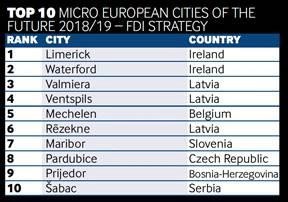Speeches Shim

USAID makes Bosnia attractive to investors, one municipality at a time
Efforts to make small cities in Bosnia and Herzegovina (BiH) ‘business friendly’ seem to be paying off. London-based Financial Times (FT) included such BiH cities in its 2018/19 report ranking the most promising European cities and regions for investors.
The BiH cities of Bijeljina and Prijedor are among the FT’s top 10 small and top 10 micro European ‘Cities of the Future’. Bijeljina (small) and Prijedor (micro) are both ranked among the top European cities for future investment based on cost effectiveness, while Prijedor is also ranked among the 10 microcities with the best strategy for attracting foreign direct investment.
This recognition is further proof of the quality and significance of the regional program for Business Friendly Certification (BFC) in South East Europe, which over time has grown into an internationally recognized standard for improving a city’s investment climate.
In 2016-2018, USAID supported the BFC process in 17 municipalities in BiH – including Bijeljina and Prijedor – through its Restoring Accountability and Supporting Transformation (RAST) project. In both cities, USAID also supported construction of access roads in newly developed industrial zones.
“We are trying to prepare in advance the industrial zones for investors and provide the best possible conditions for them to work,” said Prijedor Mayor Milenko Đaković.[1]
“[The BFC program] motivated us and provided clear guidance on how to establish an efficient and transparent local administration. Obtaining the certificate helped the city very much, because, in the effort to comply with the rigorous BFC criteria, many changes happened in the behavior and attitudes of people who work in city administration and related institutions,” Đaković said.
“Investors do not seek only cheap labor any more. They look for the towns with positive environment, stable political and security situation, good infrastructure, and conditions for working well with the governments,” Đaković said.
Đaković says the results of this approach are already visible, and according to his advisor Mišo Reljić, the private sector is expected to invest around 50 million KM and open 1,000 new jobs in Prijedor in 2019.
In Bijeljina, the interest of foreign investors also increased significantly after the city received its BFC and was featured as a FT European city of the future. So far, interested investors have come from Germany, Austria, and Italy, the latter two of which are considering opening automobile factories, Bijeljina Mayor Mićo Mićić told BiznisInfo.[2]

Comment
Make a general inquiry or suggest an improvement.